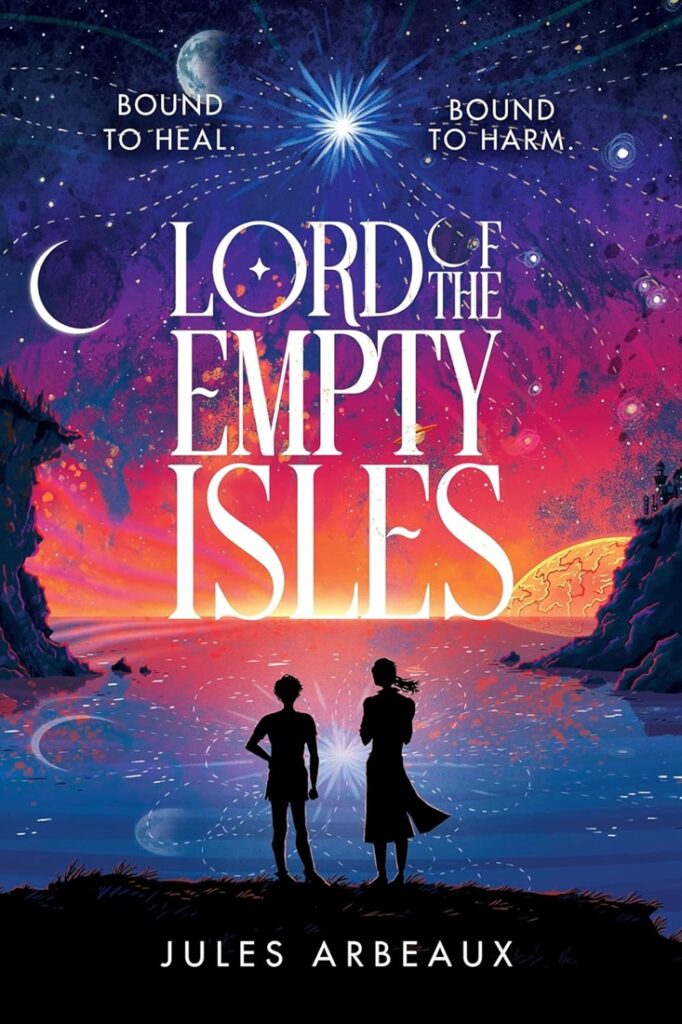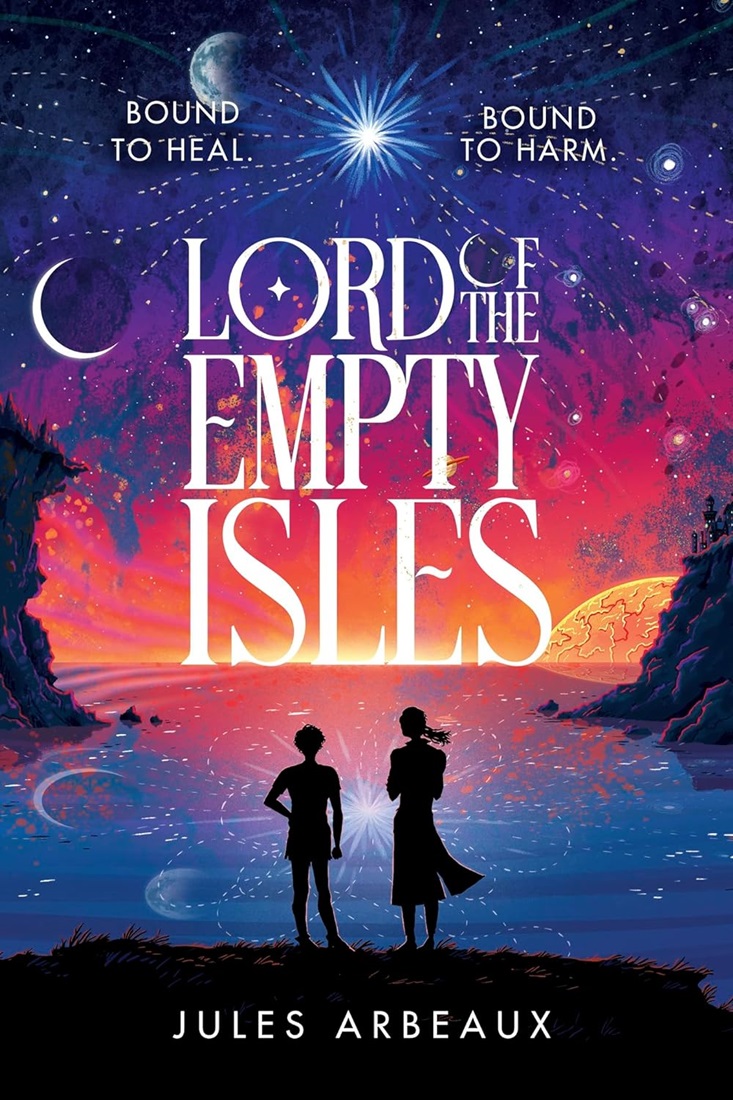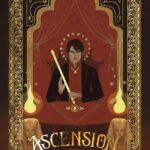
Genres: Adult, Queer Protagonists, Science Fantasy
Representation: Aroace MC, secondary nonbinary character, queerplatonic relationships
PoV: Third-person, present-tense
Published on: 6th June 2024
ISBN: 1399724967
Goodreads

Interstellar fugitive Idrian Delaciel will die by inches, and Remy Canta will laugh as he goes.
Five years ago, Idrian ordered a withering—a death curse—cast on Remy's brother that cost him his life, and Remy hasn't been the same since. Now Remy finally has the materials he needs to return the favour, but he has one major problem. When he casts the withering, it rebounds onto him.
The implications are unthinkable: Remy is fatebound to his brother's killer.
Even worse, the only way to slow the curse for long enough to find a cure is to join forces with Idrian and his criminal crew. But when he gets there, Remy discovers there are more than just their lives at stake.
Idrian is the sole provider of life-saving supplies to tens of thousands of innocents, and when he dies, they'll die with him. Caught up in perilous heists and a race against time, Remy finds himself truly living for the first time since his brother died.
Too bad for Remy—the only way to stop a withering is to kill the witherer.
Winter's Orbit meets The Long Way to a Small Angry Planet in this story of loss, power, and privilege with a queerplatonic hate to love story at its heart.
I received this book for free from the publisher via NetGalley in exchange for an honest review. This does not affect my opinion of the book or the content of my review.
Highlights
~comfy clothes > sexy clothes
~revenge gets ComplicatedTM
~hoverboard!!!
~platonic soulmates ftw
~on your own head be it if you fuck with the doctor
Lord of the Empty Isles is a book that completely defies expectations in some ways, while making use of well-worn – and well-loved – tropes in others. I mean, just mixing fantasy and sci fi in the same setting is still a rare thing (which it shouldn’t be: PUBLISH MORE SCIENCE FANTASY, PUBLISHERS!), and Arbeaux does so deftly, but Arbeaux has also written a story that elevates and celebrates non-romantic relationships – which might be even rarer than science fantasy.
And I loved it!
Aroace Remy is a citizen on the planet Verdine – a planet that, in the past, suffered complete climate collapse. But a lot of hard work has seen it recover, and now in the present day, people are not so much environmentally friendly so much as they are environmentally vigilant. Breaking any of the strict environmental laws – or the population laws that restrict each family to one child only – gets the convicted sent to the Empty Isles: Alta, Fluora, or Toxys. They’re not actually islands; they’re man-made moons, and way back when they held Verdine’s survivors while the planet healed enough to be able to support life again. But these days the moons (or Isles) are inescapable prisons, and the people who get sent there never come back.
This is very important.
Idrian Delaciel is a famous criminal who runs his operations out of the Isles. Five years before the book starts, he had Remy’s brother, Cam, killed. And in the opening pages, Remy finally gets what he needs to return the favour.
Here’s where the magic comes in: in this world, there are those who can see the bonds tying people together, and those who can, to a limited extent, manipulate them. The lore Arbeaux poured into this set-up is fascinating without being overwhelming; most of our information on the different kinds of bonds comes from the excerpts of an in-world text called On the Manipulation of Tethers, excerpts that kick off most chapters. To be honest, I would happily read On the Manipulation of Tethers in its entirety, if Arbeaux decided to actually write it, because it really was SO COOL. (As an example, what kind of bond it is you have with this other person determines where on your body it is anchored – it could be your hands, your head, your FEET… I mean. FEET!!! I loved all of this SO MUCH.)
Remy, as the blurb says, is a witherer – someone who can cut bonds (with the consent of those involved), or, with the right materials, place a death-curse on a person.
Which he does. On Idrian. Because fair’s fair, right? Idrian had Cam killed; now Remy’s going to kill Idrian.
…Small problem: turns out Remy has a fatebond with Idrian – which means he, Remy, is now under the curse too.
In all fairness, HOW WAS HE SUPPOSED TO GUESS HE WAS FATEBOUND TO THAT GUY? OUT OF ALL THE PEOPLE IN THE UNIVERSE? I wouldn’t have seen it coming either!
Of course, we know all this going in – it’s there in the blurb. And Arbeaux does not dilly-daddle; Remy casts the withering in the first couple of chapters.
From there, things take off.
She makes work of anger, and silence of sadness.
I think the reasons Lord of the Empty Isles is getting compared to Winter’s Orbit and The Long Way to a Small Angry Planet are: space; queerness between two guys (although there is no romance here); being flung together and making connections/found family under pressure; and, most conclusively, Arbeaux’ prose is compulsively readable. (I may not have 5-starred Winter’s Orbit, but you can’t say Everina Maxwell’s writing isn’t wonderfully easy to read.) Case in point: I don’t think many authors can hold your attention when the blurb has already given you the whole story. But Arbeaux had me hooked; by the just-enough worldbuilding; by Remy’s intense, visceral emotions; by the laugh-or-you’ll-cry mix-ups; by the utter refusal to give us an easy answer to some of the thorniest, and most painful, questions humans can ask ourselves.
That’s what lingers with me, now that I’ve read the book: the ugly ethical tangles Remy and Idrian – and everyone counting on Idrian – are in. Arbeaux makes no effort to simplify things for us or give us easy answers – or any answers at all; if anything, I think Lord of the Empty Isles implies that there are no correct answers. The problem – Idrian doing terrible things in order to safeguard thousands of other people – is unsolvable. You can’t truly say he’s wrong for doing what he needs to do to save so many – but you can’t say he’s ‘right’ either. Doing terrible things for good reasons doesn’t make the things not-terrible any more. And I was quietly pleased that Arbeaux didn’t try to convince us otherwise – didn’t try to influence the reader’s opinion one way or the other. Arbeaux just – presents the problem, if that makes sense. Shows us all sides of it, in what I thought was a very unbiased manner.
And then lets us work out what we think and feel for ourselves.
It’s kind of impossible not to think of Palestine while reading Lord of the Empty Isles – the situation of those in the prison-moons is in many ways analogous to that of Palestinians, and I doubt Arbeaux meant for that comparison to be made, but what with the book being published when it is, it’s inevitably going to be made. And so the issue of Idrian – or rather, the issue of the impossibly cruel living conditions on Alta, Fluora, and Toxys – packs a lot more punch than it might otherwise. (And it packs a huge punch all by itself – this is not a book that relies on the echoes of real-world events to reach its readers.)
Ultimately, the question is not really is Idrian right or good? because – that’s unanswerable, and really, it’s a distraction from the real question. The real question being: can we allow people to suffer like this? Any people, no matter who they are or what they’ve done or not done? Is it ever acceptable?
And the answer to that is no. Of course it’s no. It should and will always be no.
Which begs the next question: what on Earth (or Verdine, rather) is Remy supposed to do? Because the only way to end the curse he placed on Idrian – and everyone fatebound to Idrian, including Remy – is for Remy to die.
Can he do that? Is he brave enough to do that? Yes, the curse will kill him anyway if it isn’t lifted, so really, he’s going to die no matter WHAT he does. But still: stepping forward and volunteering to be killed is…almost impossibly difficult, even if you’re already under a death sentence.
I think I’ve only ever read one book where the main character died. It’s not something storytellers do often. To be honest, it’s become very hard for me to really believe that a main character is in any real danger, because the main character always survives. There’s always a loophole, a way out, a deus ex machina. And I will say that Arbeaux did not manage to convince me that Remy was doomed; I was waiting for the last-second save, and I even thought I’d worked out how Remy could be saved while also ending the withering.
Well. I was wrong about how the withering situation was…resolved. And that’s all I’ll say about that.
For Cam, the answer to the question of attraction was all of the above. For Remy, it’s always been none, and his life has been no less rich for it. He’s never longed to be desired–not how people like Fluora expect him to–so it seems useless to choke himself with clothes other people might like to see him in. Wearing what he loves and having someone who understands him at his side is enough.
Lord of the Empty Isles starts with a bloody knife and doesn’t slow down for a moment – but it’s never too fast, never too quick to allow us to process the horrors we’re shown, the secrets revealed, or the poignant emotional moments that give it all meaning. And it’s not just emotional ‘moments’; this book is defined by emotion, runs on it, is emotion made manifest. The live-wire intensity of absolutely every possible feeling runs through every scene, every sentence, every word. This book WILL make you feel; it will make you feel ALL the things.
Admittedly, one of those things…might be disappointment. I think Lord of the Empty Isles stumbled massively in its ending; not with the withering and how that went down, but with the, uh…in how the day was saved. I was (and remain) really confused about how simple and easy it all turned out to be, when the rest of the book was so unafraid of facing complicated questions without nice neat answers. It rang false, and too convenient, and just – absolutely impossible to believe. I would happily have given the book five stars, if not for that.
Some discussion under the spoiler tag;
View Spoiler »I also think Lord of the Empty Isles didn’t quite accomplish the found family trope it was clearly going for – the cast was a little too big, with most of Idrian’s crew – these people who are also fatebound to him, like Remy – remaining very washed-out. But I didn’t mind that so much when we had Remy’s amazing friendship with Tirani, his bestie who is very much along for the ride because CLEARLY Remy cannot be allowed to zoom around unsupervised – and Remy’s gradually-growing relationship with Idrian. Which, again, is not romantic. The author has called it queerplatonic, and I think the term fits perfectly; if you’re not familiar with it, then think of Remy and Idrian as falling in love, but platonically, not romantically. The development of that relationship was really well done and beautiful to watch – not to mention hugely validating and generally joy-making, as an ace reader who would really love to see more stories valuing other relationships over sex and/or romance!
In fact, this whole book is about the importance of non-romantic love. (There is one romance we’re aware of, but it’s very much in the background, taking place between a secondary and tertiary character.) And I think this is one of the areas in which Lord of the Empty Isles really shines; I felt so much like this book was talking about – among other kinds of love – the love we’re supposed to feel for all other human beings. I think the closest term for this might be agape – which in Christianity refers to the love God feels for humans and humans for god, but is also sometimes used to mean love for your fellow humans; the love you’re supposed to feel for them BECAUSE they are human too. The hardest kind of love, because you’re meant to also feel it for people you hate, for monsters, for people who’ve hurt you.
And it’s not – I don’t think – that Arbeaux is telling us we have to love everyone everywhere all at once. It’s just that – that’s what Idrian’s motivation is. The whole network of people breaking the law, doing sometimes terrible things – they’re doing it because how can you NOT, how can you not see/know other humans are suffering and not help? Would it not break your heart, as surely as any romantic break-up, to not-help when you could have? We are supposed to, we need to, feel enough love for our fellow humans that we draw lines we will not cross even with people we despise, even with criminals, even with people who have done worse evils to us or others. That’s why criminals are (supposed to be) treated humanely; it’s why we don’t, Remy, murder the people who’ve wronged us; it’s why we have the whole concept of human rights.
Remy is wonderful. I adored him, and I adored Tirani and I adored Idrian. I adored how much Lord of the Empty Isles values and highlights non-romantic love, gives it pride of place in a world where that throne almost always belongs to romance.
But my biggest take-away from this book is how, when push comes to absolute shove, the love we’re supposed to feel for all other people is the most important. Is the one worth sacrificing anything for. Is the one we can never, ever give up on, no matter how hard it is.
Even if it means we have to die.
(I’m not saying I could do that, could die for a cause or sacrifice myself for the greater good. But I am saying that I would like to be the kind of person who could.)
Lord of the Empty Isles is a compulsively readable science fantasy that wrestles with some of the biggest and most painful questions we have. Although the execution is a touch uneven in places, it wins major points from me for a story I couldn’t put down, Feels that had me almost vibrating out of my skin, and the sense that I just brushed against something like grace.







Leave a Reply